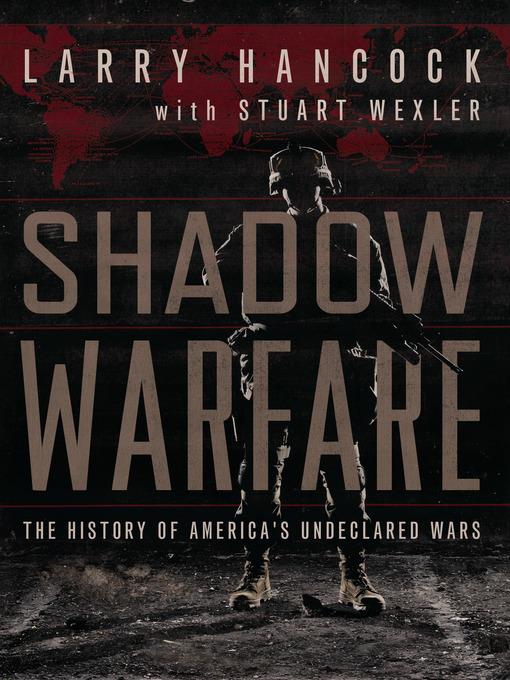
Shadow Warfare
The History of America's Undeclared Wars
کتاب های مرتبط
- اطلاعات
- نقد و بررسی
- دیدگاه کاربران
نقد و بررسی

January 20, 2014
Hancock and Wexler (co-authors of The Awful Grace of God) present a comprehensive, well-researched, and up-to-date analysis of U.S. shadow warfare: the covert and clandestine operations that began with the Cold War and extend into the current War on Terror. Covert warfare’s objective is “to obtain results without visible American military involvement in the actual fighting.” Its legality has been disputed, but it has been authorized by “a succession of presidents over some seven decades.” The Communist conquest of China was countered by involvement with Nationalist exile forces in Burma; by two decades of covert operations in Tibet; and by a final throwdown in Indochina—all unsuccessful. Long-term covert warfare against Castro’s Cuba also proved a total failure, though in the Congo, American efforts were more successful. Yet throughout the 1970s, covert warfare increasingly came “under the legislative microscope,” and its “dark side” manifested in actions conducted through the 1980s against revolutionary movements in Latin America. Simultaneously, in Afghanistan, support for anti-Soviet insurgents midwifed a generation of Islamic terrorists. Fighting these new adversaries has produced a merging of the “covert and conventional,” emphasizing nation-building on one hand and individual targeting on the other, but, as the authors note, the success and prospects of both remain limited.

February 15, 2014
Congress declares war, right? Constitutionally, yes--but, as intelligence analysts Hancock and Wexler (The Awful Grace of God: Religious Terrorism, White Supremacy, and the Unsolved Murder of Martin Luther King, Jr., 2012) write, there's a reason it doesn't. "It is significant to note," write the authors, "that the United States Congress has not officially declared war since 1941." That hasn't kept America from waging dozens of wars large and small, but the point is deniability: If a war goes pear-shaped, then Congress allows the president to take the blame. It's a convenient arrangement, save that it has left presidents free to do things like land divisions in Vietnam and Iraq. Yet, as Hancock and Wexler demonstrate, Asia is almost an outlier: It's really been Latin America that has born the weight of America's military operations, especially covert ones, for years. They document, for instance, the U.S. military's involvement in hunting down Che Guevara, supposedly the work of the Bolivian army, and the role of the U.S. government in destabilizing and overthrowing other governments. The first president to do so vigorously was Dwight Eisenhower, who had no problem utilizing "surrogate troops, 'mercenary' air support, intense psychological warfare, and threat of political assassinations." Since then, other presidents have made ample use of the formula. The handy thing about all this, for a president, is that the constitutional system of checks and balances gets put on the shelf. Cynics will find nothing new in the authors' overall argument, though even the best-schooled of them will find surprises: We all know that the U.S. mined the harbors of North Vietnam, but who knew that Ronald Reagan did so in Nicaragua? Who knew that the CIA has worked hand in hand with the world's major drug dealers, and that, for all its bloated budget, the Pentagon's major emphasis is now on cost-effective, good-bang-for-the-buck "gray warfare"? Readers who care about the intentions of the Founders and the niceties of human rights will come away depressed by this grim yet trenchant portrait of American imperial reach--and overreach.
COPYRIGHT(2014) Kirkus Reviews, ALL RIGHTS RESERVED.

March 1, 2014
All American presidents since Franklin Roosevelt have ordered clandestine military actions. Hancock and Wexler investigate why commanders-in-chief find secrecy appealing. The U.S. sponsorship of the operations detailed in this tome was concealed in most cases to avoid political controversy within the U.S. or within a country hosting the covert program. The authors cite FDR's authorization to create an American air force in Chinathe Flying Tigersas a template; the president decided the action was necessary but impolitic to reveal to the public. So it went with secret Cold War military operations in Tibet, Indochina, Guatemala, Cuba, Nicaragua, and Afghanistan. So it continues in the conflict with radical Islam. Deniability as a feature of covert warfare parallels the authors' attention to tactical methods, such as the use of front companies, which may interest readers of intelligence history, while those concerned with the constitutionality of this subject will be sated with discussion of its legal aspects. Because their extensive research is wrapped in politically neutral prose, Hancock and Wexler can engage a range of readers with a controversial topic.(Reprinted with permission of Booklist, copyright 2014, American Library Association.)

























دیدگاه کاربران